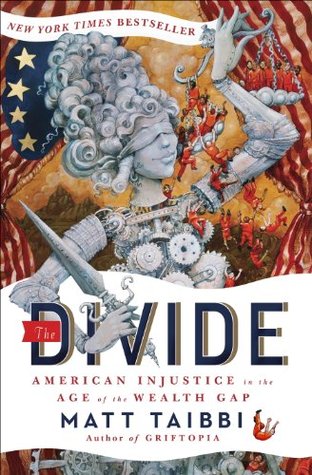More on this book
Community
Kindle Notes & Highlights
by
Matt Taibbi
Read between
December 12 - December 18, 2023
Winners get rich and get off. Losers go broke and go to jail. It isn’t just that some clever crook on Wall Street can steal a billion dollars and never see the inside of a courtroom; it’s that, plus the fact that some black teenager a few miles away can go to jail just for standing on a street corner, that makes the whole picture complete.
where common city courts become factories for turning poor people into prisoners, while federal prosecutors on the white-collar beat turn into overpriced garbage men, who behind closed doors quietly dispose of the sins of the rich for a fee.
Low-class people do low-class things.
It’s a system that’s also set up to make consequences for nuisance arrests almost impossible, which emboldens police to ever-stupider behavior, which in turn leads to less respect for the law—an endless cycle of idiocy.
No, you jump a fare in Manhattan, and it’s Manhattan cops who will knock you on the head and throw you in jail. And no judge will excuse you from the New York City dock because your home address happens to be Paterson, New Jersey.
It’s not that it’s written anywhere that if you’re black and you live in the projects, you don’t get protection against illegal searches—it just sort of works out that way.
Twenty-six billion dollars of fraud: no felony cases. But when the stakes are in the hundreds of dollars, we kick in 26,000 doors a year, in just one county.
Because there’s a direct correlation between need and rights. The more you need, the more you owe, the fewer rights you have.
People assume that a system that favors the rich likes rich people. This isn’t true. Our bureaucracies respond to the money rich people have, and they bend to the legal might the rich can hire, but they don’t give a damn about rich people.
The system eats up rich people, too, because it’s not concerned with protecting any individuals, even the rich ones. These bureaucracies accomplish just two things: they make small piles of money smaller and big piles of money bigger.
For three hundred dollars a month, she was about to become more heavily scrutinized by the state than any twelve Wall Street bankers put together.
Thus not only may a credit card customer legally be served at some ancient address without her knowledge, it’s highly possible that the server won’t even bother to extend her that courtesy.
For this reason, when credit card holders actually contest the lawsuits filed against them, the plaintiff in the vast majority of cases (particularly if it’s a debt buyer) simply drops the case.
So how do you collect money from a cardholder who doesn’t answer his or her summons? That’s easy: you take it! The laws are different from state to state, but in most places in America, once the bank or debt buyer has that default judgment in hand, it can legally do just about anything to the cardholder. It can put a lien on his property, it can attach her salary, it can even take his car or her office furniture.
The answer is that every single one of those hundreds of thousands of credit judgments—be they foreclosures or credit card accounts—contains a line item with a court-mandated collection fee or other such payout to local law enforcement.
You can defraud the state over and over again, and the state will still be happy to do business with you. You can still issue municipal bonds, and you can still be one of twenty-one banks given the privilege of being primary dealers of government debt.
Banks commit the legal crime of fraud wholesale; they do so out in the open, have entire departments committed to it, and have employees who’ve spent years literally doing nothing but commit, over and over again, the same legal crime that some welfare mothers go to jail for doing once.
The system is not disgusted by the organized, mechanized search for profit. It’s more like it’s impressed by it. And even when circumstances force the government to take notice, they act like Marcia Clark or Chris Darden in summation, apologizing for having the temerity to point a finger at lovable ol’ O.J.


